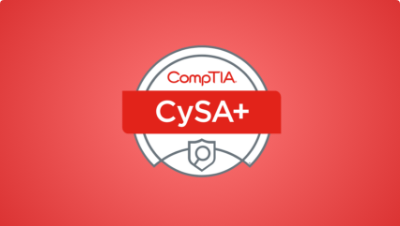
Overview
The CompTIA CySA+ exam is an internationally targeted validation of intermediate-level security skills and knowledge. While there is no required prerequisite, the CompTIA CySA+ certification is intended to follow CompTIA Security+ or equivalent experience and has a technical, “hands-on” focus on IT security analytics. The CompTIA CySA+ examination is designed for IT security analysts, vulnerability analysts, or threat intelligence analysts. The exam will certify that the successful candidate has the knowledge and skills required to configure and use threat detection tools, perform data analysis and interpret the results to identify vulnerabilities, threats, and risks to an organization with tend goal of securing and protecting applications and systems within an organization.
What you will learn
- Apply environmental reconnaissance techniques using appropriate tools and processes.
- Analyse the results of a network reconnaissance.
- Given a network-based threat, implement or recommend the appropriate response and countermeasure.
- Explain the purpose of practices used to secure a corporate environment.
- Implement an information security vulnerability management process.
- Analyse the output resulting from a vulnerability scan.
- Compare and contrast common vulnerabilities found in the various targets within an organization.
- Distinguish threat data or behaviour to determine the impact of an incident.
- Prepare a toolkit and use appropriate forensics tools during an investigation.
- Explain the importance of communication during the incident response process.
- Analyse common symptoms to select the best cyber security course of action to support incident response.
- Summarize the incident recovery and post-incident response process.
- Explain the relationship between frameworks, common policies, controls, and procedures.
- Use data to recommend remediation of security issues related to identity and access management.
- Review security architecture and make recommendations to implement compensating controls.
- Use application security best practices while participating in the Software Development Life Cycle (SDLC).
- Compare and contrast the general purpose and reasons for using various cybersecurity tools and technologies.
